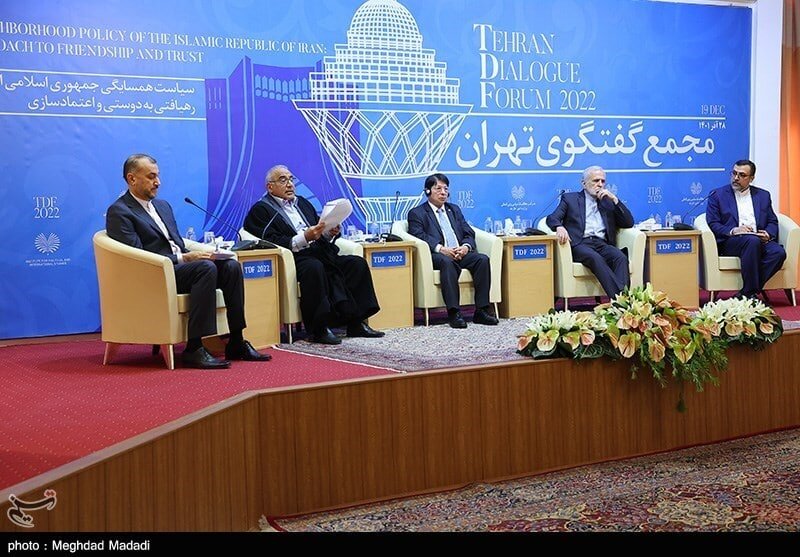Is JCPOA's ice melting in Jordan?

TEHRAN – The International Atomic Energy Agency (IAEA) delegation left Tehran for Vienna on Monday after holding talks with Iranian officials over a range of relevant issues.
The delegation, led by IAEA Deputy Director General and Head of the Department of Safeguards Massimo Aparo, discussed with the Iranian authorities safeguards issues and future cooperation plans, according to Iranian media.
Outstanding safeguards issues have been a major roadblock in talks in Vienna over reviving the 2015 Iran nuclear deal, officially known as the Joint Comprehensive Plan of Action (JCPOA).
Iran has reportedly demanded that the IAEA close its safeguards probe on Iran before a deal on reviving the JCPOA is signed.
The much-discussed probe revolves around uranium materials allegedly found at three Iranian sites that had not been declared to the IAEA. So far, Iran and the IAEA have discussed the matter extensively with no result. Iran has said that the probe is political and is meant to extract concessions from it in the Vienna talks. But the IAEA says the probe is independent from the JCPOA talks.
The latest visit by the IAEA could pave the way for a compromise both on the probe and the JCPOA. On Monday, an influential Iranian official said that many JCPOA-related issues have been addressed and that the safeguards issue stands out as the only outstanding matter.
Kamal Kharrazi, the head of Iran’s Strategic Council on Foreign Relations (SCFR), an advisory body to the Leader of the Islamic Revolution of Iran, implied that resolving the IAEA probe could break the ice on the Vienna talks.
Speaking at the Tehran Dialogue Forum, Kharrazi said, “Iran is ready to return to its JCPOA commitments. Many problems have so far been resolved. Only the safeguards issue remained which we hope will be resolved during the visit of the [IAEA] experts.”
The IAEA officials held talks with the chief of the Iranian Foreign Ministry Department for International, Legal and Parliamentary Affairs and the director for the Foreign Ministry Department for Arms Control and International Security.
The IAEA team also held talks with Mohammad Eslami, the head of the Atomic Energy Organization of Iran (AEOI).
As of this writing, the IAEA has not officially made any comments on the visit of the IAEA delegation. But it comes amid flurry of diplomatic meetings in the West Asia region. On Monday, Iranian Foreign Minister Hossein Amir Abdollahian met with Qatari Deputy Foreign Minister Mohammad al-Khulaifi on the sidelines of the Tehran Dialogue Forum, which was attended by a host of foreign officials and experts.
In their meeting, al-Khulaifi and Amir Abdollahian discussed “the latest about the sanctions removal talks,” according to the Iranian foreign ministry, a reference to the JCPOA talks.
And on Tuesday, Amir Abdollahian will attend a regional summit in Jordan that is likely to feature marginal talks on the JCPOA. The summit, officially known as the Baghdad Conference for Cooperation and Partnership, will be held at Amman’s King Hussein Bin Talal Convention Center and will also be attended by the European Union foreign policy chief, Josep Borrell, and Enrique Mora, the EU coordinator for the talks.
The presence of these to European officials, Mora in particular, could be an indication of an opening in the JCPOA talks because the Baghdad summit is primarily meant to addressed regional issues related to Iraq, not the JCPOA. However, the presence of Iranian and French officials as well as officials from the EU makes Amman a perfect venue for breaking the ice on the JCPOA talks.
The Iranian foreign minister has already implied that Amman could host JCPOA meetings. Underling that his contact with Borrel and Mora is ongoing, Amir Abdollahian said, “Jordan [summit] is an opportunity for us to move ahead with these talks. I hope that considering the approach of the Americans in the last three months, we will see a change of approach and the American side will behave realistically.”
The Tuesday summit will be attended by Iran, Iraq, Saudi Arabia, Jordan, Egypt, the United Arab Emirates, Qatar, Turkey, France, Oman and Bahrain, while Lebanon and Syria will be absent from the summit. Bahrain and Oman will join the summit for the first time.
Iran announced Monday that Amir Abdollahian will represent Iran at the Conference. The Iranian foreign minister left Tehran for Amman on Monday afternoon. The trip also comes amid media speculations about a possible thaw in Tehran-Riyadh relations.
Earlier this month, Amir Abdollahian held a phone conversation with High Representative of the European Union for Foreign Affairs and Security Policy Josep Borell for talks on issues of mutual significance, according to the Iranian foreign ministry.
During the talks, Amir Abdollahian expressed gratitude for Borrell’s role on the path of dialog and interaction. He criticized the diplomatically-impolite rhetoric of one or two European ministers, saying, “Today, some radical politicians in Europe hide behind the European Union and have the Union pay for them.”
“This way, the European Union’s strategic goals have fallen victim to the greed of pro-violence and even terrorist groups, which give wrong information to these politicians,” he said.
He said the European Union’s foreign policy chief has an important role in keeping the bloc away from unconstructive emotions.
Elsewhere, the two sides discussed the latest situation of sanctions removal talks and cooperation between Iran and the International Atomic Energy Agency.
Borrell, for his part, highlighted his efforts to get all sides to return to the commitments undertaken in Vienna, saying he will continue his efforts and contacts toward facilitating the achievement of an agreement.
Leave a Comment